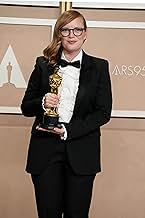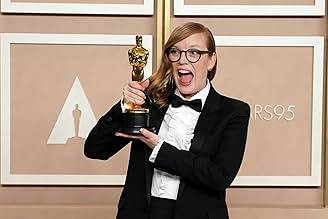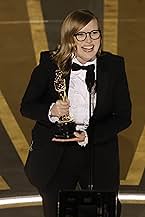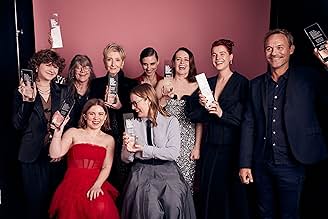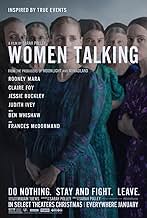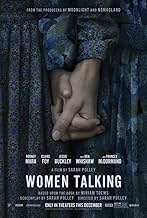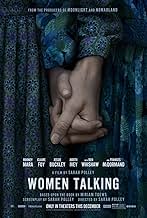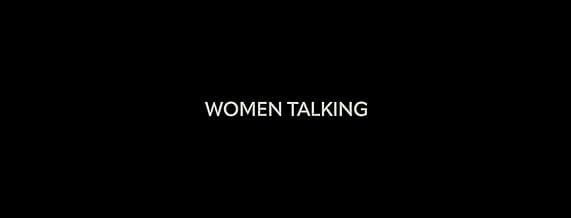Women Talking
- 2022
- Tous publics
- 1h 44min
En 2010, les femmes d'une communauté religieuse isolée s'efforcent de concilier leur réalité avec leur foi. Basé sur le roman de Miriam Toews.En 2010, les femmes d'une communauté religieuse isolée s'efforcent de concilier leur réalité avec leur foi. Basé sur le roman de Miriam Toews.En 2010, les femmes d'une communauté religieuse isolée s'efforcent de concilier leur réalité avec leur foi. Basé sur le roman de Miriam Toews.
- Réalisation
- Scénario
- Casting principal
- Récompensé par 1 Oscar
- 65 victoires et 164 nominations au total
Avis à la une
Sarah Polley's 'Women Talking' did not work for me. This story of a group of women - all of whom belong to a U. S. religious sect in the 1960's - who are physically and emotionally abused by their menfolk / husbands, seems more like a dispassionate, politically correct lecture, than a dialogue between real people. Real people in pain. And it should not have had that effect. Particularly in these times when the news is filled with detailed descriptions of what real men do to real women.
Rooney Mara, Claire Foy, and. Jesse Buckley play three young women who had been drugged and sexually accosted, and who are now part of a 'commission' asked to decide what the community's women's next steps should be. Should they remain in the community and say / do nothing, remain and fight back, or pack up and leave? In making their decision, each of the three young women describes their lives and their reasons for voting as they do. Rooney Mara's character seems the most undecided, willing to see all sides of the argument and taking different positions over the course of the film. Claire Foy is angry and outspoken but I found it difficult to ascribe a preferred next-step to her. Jesse Buckley is the angriest and, at first, the most unwilling to leave her abusive husband, and it is that - her failure to realize how abused she is - that made me care less about her than I should.
Two senior women participate in the commission and one, played by Judith Ivey - made the strongest impression on me. She has the wisdom that comes with age and the ability to put it into words. Ben Whishaw as the one man invited to the commission brings a startling honesty to the proceedings; he more than anyone knows the evil men can do.
But for me, the film's 'failure' involves the three young women. There is a cold and distanced quality to their recitals. It is as though they are relating a film they saw, a book they read, rather than expressing the anger, the anxiety, the fear they all know very well.
I should have been moved. I should have been angered. I should have been relieved. But I was not.
Rooney Mara, Claire Foy, and. Jesse Buckley play three young women who had been drugged and sexually accosted, and who are now part of a 'commission' asked to decide what the community's women's next steps should be. Should they remain in the community and say / do nothing, remain and fight back, or pack up and leave? In making their decision, each of the three young women describes their lives and their reasons for voting as they do. Rooney Mara's character seems the most undecided, willing to see all sides of the argument and taking different positions over the course of the film. Claire Foy is angry and outspoken but I found it difficult to ascribe a preferred next-step to her. Jesse Buckley is the angriest and, at first, the most unwilling to leave her abusive husband, and it is that - her failure to realize how abused she is - that made me care less about her than I should.
Two senior women participate in the commission and one, played by Judith Ivey - made the strongest impression on me. She has the wisdom that comes with age and the ability to put it into words. Ben Whishaw as the one man invited to the commission brings a startling honesty to the proceedings; he more than anyone knows the evil men can do.
But for me, the film's 'failure' involves the three young women. There is a cold and distanced quality to their recitals. It is as though they are relating a film they saw, a book they read, rather than expressing the anger, the anxiety, the fear they all know very well.
I should have been moved. I should have been angered. I should have been relieved. But I was not.
It's an ensemble drama set within 24 hours in 2010 in an unknown location. It follows the conversation of three generations of women discussing how to respond to the sexual abuse and rape experienced by many women in the colony over the previous years.
The conversation occurs while the colony's men are away in the city, raising bail for colony men arrested for sexual crimes. Eight women participate in most of the discussion. Two grandmother matriarchs are Agata (Judith Ivey) and Greta (Sheila McCarthy). The next generation includes Ona (Rooney Mara), an unmarried woman pregnant with a child resulting from rape. Mariche (Jessie Buckley) is married to a very abusive husband. Salome (Clare Foy) is Ona's younger married sister who is very angry over the abuse of her young daughter. Some girls from the next generation provide comments and some narration to the film. Scarface Janz (Frances McDormand), another matriarch, leaves the discussion early. Since the women are illiterate (only boys go to school), they ask the schoolteacher, August (Ben Whishaw), to record their discussion. August, who had left the colony with his mother, was university-educated but was allowed to return to teach school.
The film shows no sexual violence but does show some results of the violence. The only adult male face seen throughout is that of August. The women discuss three options: staying and forgiving the perpetrators, staying and fighting the perpetrators, or leaving with all the children under a certain age. They must make a quick decision because one of the men is returning from the city in the evening. The decision taken by the group is a very "Mennonite" one.
I had a lot of ambivalence going into the film. I didn't like the novel when I read it several years ago. The author closely tied the story to accounts of crimes in one of Bolivia's very conservative Mennonite groups. However, the novel's nuanced dialogue was far beyond illiterate Mennonite women without education who could not even read a map. And a university-educated August would never be allowed back to teach in such a conservative colony.
Sarah Polley extracts the story from Mennonite specificity (the film never mentions the word and doesn't mention "Mennonite" last names). Polley uses very subdued colors in the filming, reinforcing the conservative impression. Although the movie's setting still looks Mennonite, its greater abstraction allowed me to focus on the issues being discussed--rage, forced ignorance, the necessity of faith and how to reconcile this faith with what happened, how best to embody their pacifist ethic, etc. The discussion is wide-ranging and doesn't provide easy and ready solutions. Rooney Mara, Claire Foy, and Jessie Buckley are excellent as they express contrasting and shifting perspectives.
"Women Talking" probably needs to be seen multiple times to get all the layers. The Mennonite context sells the movie, but for me, it only made sense to push that representation to the rear. I wish critics would focus on it less. The film's ending unfolds a little too slowly once their decision has been made.
The conversation occurs while the colony's men are away in the city, raising bail for colony men arrested for sexual crimes. Eight women participate in most of the discussion. Two grandmother matriarchs are Agata (Judith Ivey) and Greta (Sheila McCarthy). The next generation includes Ona (Rooney Mara), an unmarried woman pregnant with a child resulting from rape. Mariche (Jessie Buckley) is married to a very abusive husband. Salome (Clare Foy) is Ona's younger married sister who is very angry over the abuse of her young daughter. Some girls from the next generation provide comments and some narration to the film. Scarface Janz (Frances McDormand), another matriarch, leaves the discussion early. Since the women are illiterate (only boys go to school), they ask the schoolteacher, August (Ben Whishaw), to record their discussion. August, who had left the colony with his mother, was university-educated but was allowed to return to teach school.
The film shows no sexual violence but does show some results of the violence. The only adult male face seen throughout is that of August. The women discuss three options: staying and forgiving the perpetrators, staying and fighting the perpetrators, or leaving with all the children under a certain age. They must make a quick decision because one of the men is returning from the city in the evening. The decision taken by the group is a very "Mennonite" one.
I had a lot of ambivalence going into the film. I didn't like the novel when I read it several years ago. The author closely tied the story to accounts of crimes in one of Bolivia's very conservative Mennonite groups. However, the novel's nuanced dialogue was far beyond illiterate Mennonite women without education who could not even read a map. And a university-educated August would never be allowed back to teach in such a conservative colony.
Sarah Polley extracts the story from Mennonite specificity (the film never mentions the word and doesn't mention "Mennonite" last names). Polley uses very subdued colors in the filming, reinforcing the conservative impression. Although the movie's setting still looks Mennonite, its greater abstraction allowed me to focus on the issues being discussed--rage, forced ignorance, the necessity of faith and how to reconcile this faith with what happened, how best to embody their pacifist ethic, etc. The discussion is wide-ranging and doesn't provide easy and ready solutions. Rooney Mara, Claire Foy, and Jessie Buckley are excellent as they express contrasting and shifting perspectives.
"Women Talking" probably needs to be seen multiple times to get all the layers. The Mennonite context sells the movie, but for me, it only made sense to push that representation to the rear. I wish critics would focus on it less. The film's ending unfolds a little too slowly once their decision has been made.
In 2010, the women of a Mennonite community must come together to make a decision following the discovery of a terrible secret of the men in their community. There are three options: do nothing, stay and fight, or leave. Great. The incipit is undoubtedly as interesting as it is a thriving ground for opening an important dialogue on concepts such as faith, misogyny, and feminism.
While it is an important film, and an important issue, I found the script to be profoundly insincere and artificial, in dialogue that is more like a skein of feminist slogans piled one after another. The way the characters express themselves, interact, and behave is mechanical and relegated to the stereotype of women they represent. To the most controversial character, McDormand's, I was sorry that, even in her being at fault, no space was left.
On a technical level there is nothing particularly significant; the coloring is interesting, if not particularly aesthetic. The performances of course were good, as the cast is mostly made up of great actresses.
Women Talking is commendable in its intended message, but otherwise it seems a wasted opportunity of cast as much as of reference material.
While it is an important film, and an important issue, I found the script to be profoundly insincere and artificial, in dialogue that is more like a skein of feminist slogans piled one after another. The way the characters express themselves, interact, and behave is mechanical and relegated to the stereotype of women they represent. To the most controversial character, McDormand's, I was sorry that, even in her being at fault, no space was left.
On a technical level there is nothing particularly significant; the coloring is interesting, if not particularly aesthetic. The performances of course were good, as the cast is mostly made up of great actresses.
Women Talking is commendable in its intended message, but otherwise it seems a wasted opportunity of cast as much as of reference material.
Powered by strong performances across the board, Women Talking follows the women of an isolated & ultraconservative community who take it upon themselves to decide the course of their future in the wake of a shattering revelation which compels them to reconcile their faith with their violent reality. Bracingly crafted & effectively told, it serves as a plea, a protest & a parable all at once.
Written & directed by Sarah Polley, the story borrows its premise from a real-life event and the film is an imagined response to it - a reaction through fiction. The disturbing truth surfaces in gut-punching ways as the women argue & discuss their next move while snippets of their past adds more weight to their collective pain, rage, fear & trauma. It does get repetitive but it also gets the point across with clarity.
The colour grading is an interesting choice, for it illustrates the bleakness of their existence in a colony ripe with unchecked male aggression but more could've been achieved with the camera. Still, what it lacks in cinematic qualities, it makes up in dramatic heft & strong emotional wallop, thanks to impressive work from the entire cast, ranging from Claire Foy's fierce rendition to Ben Whishaw's tender act, all enriching the narrative.
Overall, Women Talking is a timely, topical & thought-provoking drama that brims with hate, hurt & heartbreak in its illustration of the horrifying reality of female experience but there is also hope for a better future despite the agonising brutality of their past & present. Though there was more up for grabs which it fumbles with its very own creative choices, the commitment from the cast & searing intensity of their inputs makes it an essential viewing.
Written & directed by Sarah Polley, the story borrows its premise from a real-life event and the film is an imagined response to it - a reaction through fiction. The disturbing truth surfaces in gut-punching ways as the women argue & discuss their next move while snippets of their past adds more weight to their collective pain, rage, fear & trauma. It does get repetitive but it also gets the point across with clarity.
The colour grading is an interesting choice, for it illustrates the bleakness of their existence in a colony ripe with unchecked male aggression but more could've been achieved with the camera. Still, what it lacks in cinematic qualities, it makes up in dramatic heft & strong emotional wallop, thanks to impressive work from the entire cast, ranging from Claire Foy's fierce rendition to Ben Whishaw's tender act, all enriching the narrative.
Overall, Women Talking is a timely, topical & thought-provoking drama that brims with hate, hurt & heartbreak in its illustration of the horrifying reality of female experience but there is also hope for a better future despite the agonising brutality of their past & present. Though there was more up for grabs which it fumbles with its very own creative choices, the commitment from the cast & searing intensity of their inputs makes it an essential viewing.
You go to bed then wake up bruised, bloody, quite groggy and confused; you know instantly, that your body's been abused, your mind cannot conceive, all the torment and the grief, but you're not the only one, that's being used. So the women of the colony convene, to discuss the implications of what's been, carry on like there's no wrong, stay and fight which might prolong, or leave this place, put barriers between. The conversations, confrontations ebb and flow, the picture of what's taken place is shown, anguish, misery and despair, amongst a culture built on prayer, where the men have their own rules, their manifesto.
It's a wonderful piece of filmmaking that engages from the outset with great dialogue, a disturbing story, and an empowering conclusion - with outstanding performances throughout.
It's a wonderful piece of filmmaking that engages from the outset with great dialogue, a disturbing story, and an empowering conclusion - with outstanding performances throughout.
Le saviez-vous
- AnecdotesExplaining the color grading of the film, director Sarah Polley said the filmmakers played with saturation levels to create a feeling of "a world that had faded in the past." This is why the film appears to be almost black and white, but not quite.
- GaffesNettie identifies as a man name "Melvin". The Mennonite do not allow members to identify as anything other than their biological sex and gender. In real life, Nettie would have been excommunicated. There are over one hundred different Anabaptist (Amish, Brethren, Hutterite, Mennonite) church groups, counting more than 6,000 congregations, all holding to slightly different traditions and their own interpretations of the Bible. The movie never identified the Anabaptist group of the colony.
- Bandes originalesDaydream Believer
Written by John Stewart
Performed by The Monkees
Courtesy of Rhino Entertainment Company
By arrangement with Warner Music Group Film & TV Licensing
Meilleurs choix
Connectez-vous pour évaluer et suivre la liste de favoris afin de recevoir des recommandations personnalisées
Détails
- Date de sortie
- Pays d’origine
- Site officiel
- Langue
- Aussi connu sous le nom de
- Ellas hablan
- Lieux de tournage
- Enercare Centre, 100 Princes' Boulevard, Toronto, Ontario, Canada(Barn interior scenes)
- Sociétés de production
- Voir plus de crédits d'entreprise sur IMDbPro
Box-office
- Montant brut aux États-Unis et au Canada
- 5 456 531 $US
- Week-end de sortie aux États-Unis et au Canada
- 40 530 $US
- 25 déc. 2022
- Montant brut mondial
- 9 276 103 $US
- Durée1 heure 44 minutes
- Couleur
- Rapport de forme
- 2.76 : 1
Contribuer à cette page
Suggérer une modification ou ajouter du contenu manquant








